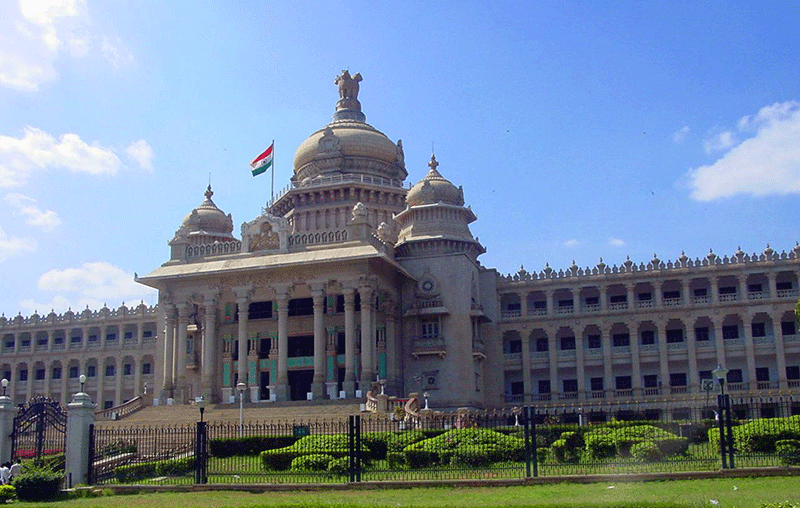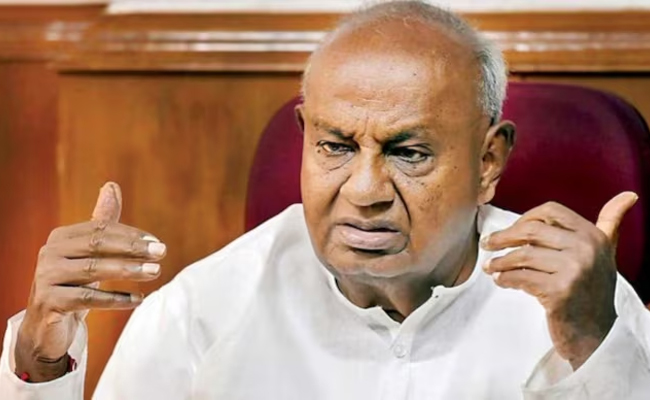Bengaluru, Sep 21: The Karnataka Assembly on Wednesday passed a Bill to constitute new universities in seven districts and to upgrade Unitary University in Mandya, as Higher Education Minister C N Ashwath Narayan promised to bring in new laws to ensure reforms in the functioning of such institutions in the state.
The Karnataka State Universities (Amendment) Bill, 2022 was passed after it was thoroughly discussed by the House, during which legislators from across party lines, including the Chair expressed concerns about the quality and functioning of universities in the state and rampant irregularities in many of them.
The Bill in its financial memorandum states that with regard to the establishment of new universities there will be an approximate expenditure of Rs 14 crore per annum towards the annual recurring expenditure at Rs 2 crore for each varsity.
Narayan, piloting the Bill, said: "It is the demand and aspiration that there should be a university in all the districts and in this direction as a step the government is opening new universities in seven districts -- Kodagu, Chamarajanagar, Hassan, Haveri, Bidar, Koppal and Bagalkote, and in Mandya district we will be expanding the existing university."
According to the National Education Policy, there should be at least one university in every district to fulfill the educational and skill needs of the youth there, he said.
It has also been a long-standing demand and hence the Chief Minister had made an announcement in the budget for certain districts and the same will be considered for other districts in the days ahead, the minister added.
As per the Knowledge Commission, UGC and National Education Policy, there should not be more than 100 colleges under one university, he further said, adding that now the aspiration is that every college has to be developed to a status of degree-awarding autonomous university by 2035.
Intervening, Speaker Vishweshwar Hegde Kageri expressed concern about the quality and the condition of existing universities, while adding that the government should also focus on improving their quality and infrastructure.
Pointing out that thousands of students go to countries like Canada from the state to pursue their higher education, he said: "Then what is the quality of our universities here...improving the quality of universities and education provided there should be of highest priority."
Addressing the concerns expressed by the Chair and several legislators regarding the quality and other issues in universities, the minister said allocations have been considerably enhanced to universities upgrade them.
Noting that it has been nearly 22 years since the Karnataka State Universities Act came into existence, he said new legislations have to be enacted for bringing in accountability and reforms to address the current challenges.
"We are taking steps to bring in new legislation, committee has been formed, which has submitted report and public opinion has been sought, aimed at addressing all issues concerning recruitment, administration, ensuring transparency, accountability, quality education, skill development and integration," he said, adding the laws will be separate for public and private universities.
Earlier, Congress Deputy Leader in the Assembly U T Khader advised that the government should frame rules to maintain the quality and standards in varsities, pointing out that Mangaluru University has come down from A-grade to B-grade and may even further come down to C-grade.
Several legislators like JD(S)' A T Ramaswamy said that those who are genuinely concerned about higher education and the future of the student community should be appointed as Vice Chancellors and to university syndicates, as they lamented about legislators and politicians making recommendations for unworthy people. They also pointed at malpractices for good results at deemed universities.
Congress MLAs Eshwar Khandre and P T Parameshwar Naik pointing out lack of basic infrastructure, facilities and faculty at various existing universities, said, "when such is the state, announcing new universities will be only like applying ghee to the lips."
BJP MLA Arvind Bellad suggested that the building construction and recruitment powers should be withdrawn from universities, so that they can focus only on academic activities.
Also, there should be a common exam system instead of each private university having their own exams, he said.
Pointing at there are currently 27 universities in the state and most of them lack facilities and qualities, Congress MLA Krishna Byre Gowda said, to set up each university it will cost Rs 100-150 crore and there will be annual costs on top of that, so eight new universities will lead to spending hundreds of crores.
"Without looking into the quality of existing university, establishing new ones, seems to be aimed at only appeasement with election approaching," the legislator said, as he also pointed at earlier CAG reports on rampant irregularities in recruitment and activities at various universities in violation of laws.
ರಾಜ್ಯದ ವಿವಿಧ ಜಿಲ್ಲೆಗಳಲ್ಲಿ 7 ನೂತನ ವಿಶ್ವವಿದ್ಯಾಲಯಗಳು ಹಾಗೂ ಮಂಡ್ಯದ ಏಕೀಕೃತ ವಿವಿಯನ್ನು ಪೂರ್ಣಪ್ರಮಾಣದ ವಿಶ್ವವಿದ್ಯಾಲಯವನ್ನಾಗಿ ಅಭಿವೃದ್ಧಿಪಡಿಸಲು ನಿರ್ಧರಿಸಲಾಗಿದೆ.
— Dr. Ashwathnarayan C. N. (@drashwathcn) September 21, 2022
ಈ ದಿಶೆಯಲ್ಲಿ 2022 ನೇ ಸಾಲಿನ ಕರ್ನಾಟಕ ರಾಜ್ಯ ವಿಶ್ವವಿದ್ಯಾನಿಲಯಗಳ (ತಿದ್ದುಪಡಿ) ವಿಧೇಯಕ ಅಂಗೀಕಾರಗೊಂಡಿರುವುದಕ್ಕೆ ಹೃತ್ಪೂರ್ವಕ ಧನ್ಯವಾದಗಳು. pic.twitter.com/S4PiZJoso5
Let the Truth be known. If you read VB and like VB, please be a VB Supporter and Help us deliver the Truth to one and all.
New Delhi (PTI): India has proposed a preferential trade agreement (PTA) with Mexico to help domestic exporters deal with the steep tariffs announced by the South American country, a top government official said on Monday.
Mexico has decided to impose steep import tariffs - ranging from about 5 per cent to as high as 50 per cent on a wide range of goods (about 1,463 tariff lines) from countries that do not have free trade agreements with Mexico, including India, China, South Korea, Thailand and Indonesia.
Commerce Secretary Rajesh Agrawal said that India has engaged with the country on the issue.
"Technical level talks are on...The only fast way forward is to try to get a preferential trade agreement (PTA) because an FTA (free trade agreement) will take a lot of time. So we are trying to see what can be a good way forward," he told reporters here.
While in an FTA two trading partners either significantly reduce or eliminate import duties on maximum number of goods traded between them, in a PTA, duties are cut or removed on a limited number of products.
Trading partners of Mexico cannot file a compliant against the decision on imposing high tariffs as they are WTO (World Trade Organisation) compatible.
The duties are within their bound rates, he said, adding that their primary target was not India.
"We have proposed a PTA because its a WTO-compatible way forward... we can do a PTA and try to get concessions that are required for Indian supply chains and similarly offer them concessions where they have export interests in India," Agrawal said.
ALSO READ: Mexico's Congress approves higher tariffs on goods from India, China and non-FTA nations
Citing support for local production and correction of trade imbalances, Mexico has approved an increase in MFN (most favoured nation) import tariffs (5-50 per cent) with effect from January 1, 2026 on 1,455 tariff lines (or product categories) within the WTO framework, targeting non-FTA partners.
Preliminary estimates suggest that this affects India's around USD 2 billion exports to Mexico particularly -- automobile, two-wheelers, auto parts, textiles, iron and steel, plastics, leather and footwear.
The measure is also aimed at curbing Chinese imports.
India-Mexico merchandise trade totalled USD 8.74 billion in 2024, with exports USD 5.73 billion, imports USD 3.01 billion, and a trade surplus of USD 2.72 billion.
The government has been continuously and comprehensively assessing Mexico's tariff revisions since the issue emerged, engaging stakeholders, safeguarding the interests of Indian exporters, and pursuing constructive dialogue to ensure a stable trade environment benefiting businesses and consumers in both countries.
ALSO READ: Search operation ends in Anjaw truck accident, 20 bodies recovered
Federation of Indian Export Organisations (FIEO) Director General Ajay Sahai has said that Mexico's decision is a matter of concern, particularly for sectors like automobiles and auto components, machinery, electrical and electronics, organic chemicals, pharmaceuticals, textiles, and plastics.
"Such steep duties will erode our competitiveness and risk, disrupting supply chains that have taken years to develop," Sahai said, adding that this development also underlines the little urgency for India and Mexico to fast-track a comprehensive trade agreement.
Domestic auto component manufacturers will face enhanced cost pressures with Mexico hiking duties on Indian imports, according to industry body ACMA.





